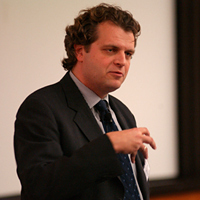| |
 |
| |
© Nathan Mandell
Conference co-organizer Prof. Daniel
Diermeier introduces the event. |
| |
|
From
physics to business, complexity conference seeks unifying
frameworks
by
Deborah Leigh Wood
Prominent
academic experts converged at the Conference on Complex
Systems, an interdisciplinary event held Oct. 24
and 25 at
the Kellogg School’s James. L. Allen Center.
"
This conference presented a unique opportunity for the Northwestern
community to experience the thinking of leading minds in the
emerging science of complexity,” said conference
co-organizer Daniel
Diermeier, IBM Distinguished Professor
of Regulation
and Competitive Practice at Kellogg.
He said
complexity research provides unifying frameworks for highly
interconnected systems with many agents, with
applications
ranging from biochemical pathways to neural networks
to social interactions such as trading floors, supply chains
and the
Internet. The
conference was sponsored by Kellogg, the Weinberg College
of Arts and Sciences, and the McCormick School of Engineering
and Applied Science, where Diermeier’s co-organizer,
Julio M. Ottino, is the Robert R. McCormick Institute Professor
and Walter P. Murphy Professor of Chemical Engineering.
The
conference facilitates transfer of knowledge across traditional
boundaries at Northwestern, Diermeier said,
to encourage
path-breaking research across disciplines.
Conference
speakers addressed subjects such as "Understanding
Genetic Regulatory Networks,” "The Evolution of
Ethnocentric Behavior” and "The Economy as a
Complex Adaptive System.”
"
Scientific breakthroughs frequently happen at the edges of
established discipline-based knowledge,” said Ottino. "Ideas
originating in one field often find successful applications
in other fields, sometimes leading to revolutionary conceptual
changes." |





